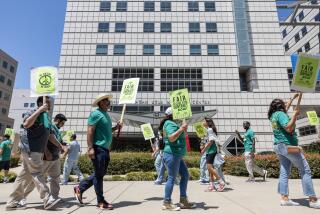Grave Dispute : Archdiocese Cemetery Workers to Vote Again on Union
- Share via
For 16 years, Hilario Ramirez, a 58-year-old Mexican immigrant who drives a battered 1965 Mustang, has dug graves in an East Los Angeles Catholic cemetery. For the last three years, he has been trying to persuade his colleagues in 10 other church cemeteries to unionize.
But Ramirez is up against an unusually powerful boss. A boss who not only speaks ill of the union as needless and disruptive, as bosses are wont to do, but who also claims standing as “your brother in Christ.”
Ramirez’s boss is Cardinal Roger M. Mahony, a man long regarded by organized labor as a passionate ally--until his own cemetery workers began organizing in 1988.
On Tuesday, after two inconclusive elections, widespread acrimony and the firing of several pro-union workers, the 150 workers of the Los Angeles Archdiocese cemeteries will vote once again on whether to unionize.
Southland labor leaders portray the drive as part of an effort to organize hundreds of thousands of low-wage Latino immigrants. Recent successes include first-time union contracts for thousands of downtown Los Angeles janitors and for more than 1,000 employees of a wheel manufacturing plant near Compton--one of the largest organizing victories in the nation in years.
However, that momentum is expected to be broken when cemetery workers cast their ballots.
Many cemetery workers--largely Spanish-speaking and Catholic--are clearly swayed by the cardinal’s standing as more than a mere employer, and by the fact that the archdiocese has made substantial improvements in pay and benefits in recent years.
When the archdiocese threw a noontime anti-union rally outside its downtown headquarters Friday, about 80 blue-uniformed cemetery workers showed up to wave signs bidding hasta la vista-- “goodby”--to the Amalgamated Clothing and Textile Workers Union.
The most optimistic thing union official Barbara Mejia will say is that the union has “a 50-50 chance.”
She and other labor leaders have complained bitterly for years that Mahony is exploiting the religious beliefs of the cemetery workers to turn them against the union.
“It’s unjust--you take a person’s religious beliefs and use it against their general welfare,” said Brad Cagle, vice president of a communications workers local, who was walking to lunch on 9th Street when he saw the archdiocese’s rally and promptly walked into the midst of it to challenge the anti-union theme.
For decades, the Catholic Church has supported unions throughout the world as indispensable in defending basic human rights.
But that does not include employees of the church itself.
Even church workers who merely dig graves “are involved in the spiritual, pastoral work of the church,” Mahony said in an interview at the rally. “The church is not a business or an industry.”
The Supreme Court supported that view in 1979, ruling that the National Labor Relations Act does not cover church labor disputes.
During the past six weeks, employees have been required to watch two videotaped addresses by Mahony in which the cardinal urged them to vote against the union and to work collaboratively with him in “the mission of the church.” In both English and Spanish, Mahony called on workers to resist the “abuses” of union supporters. He referred to home visits by union organizers--a traditional tactic in organizing drives--as showing “disrespect for you and your family.”
Cemetery workers sought out the textile union in 1988, when about 120 of them signed cards asking Mahony to recognize the union as their bargaining agent. They sought higher pay, better medical benefits and an end to what some described as oppressive treatment by supervisors.
However, Mahony declined to recognize the union. The workers then petitioned the National Labor Relations Board to conduct an election, but the board--citing the 1979 Supreme Court ruling on church workers--refused.
Mahony subsequently agreed to an election that would be held outside the jurisdiction of the labor board, supervised instead by the state Mediation and Conciliation Service.
To the surprise of many in the archdiocese, the union won, 66 to 62, in a bitter campaign punctuated by complaints of harassment and intimidation. But Mahony declined to begin contract talks, contending that unfair union conduct had poisoned the vote.
By the time a three-member arbitration panel validated the election, nearly a year had passed since the vote and Mahony ceased to bargain, noting that the union had agreed to a one-year time frame--a limit that would not have existed under federal labor law.
Mahony then held a second vote among workers without the union’s participation. This time workers voted 92 to 24 against the union. Mahony has contended that vote should be the last word on the issue.
The union last year sued to force Mahony to resume contract negotiations. Eventually the two sides agreed to settle out of court by holding a third vote. A separate suit by three union activists who had been fired by the archdiocese was also settled out of court for undisclosed terms.
The archdiocese says the average cemetery worker makes $9.76 an hour--excellent pay in today’s recessionary economy for workers who do not speak English and in many cases have few other job skills.
“We want a firm contract to guarantee” that level, said union supporter Ramirez, who makes $13.05 an hour, which he says is about $4 an hour more than he was paid three years ago. The archdiocese denies union claims that the increases came solely to stave off the union.
Alberto Flores, 41, a Honduran immigrant who is funeral director of the archdiocese’s Resurrection Cemetery in South San Gabriel, disagrees with Ramirez.
“We believe we have all we need,” Flores said. “We support the cardinal.”
More to Read
Sign up for Essential California
The most important California stories and recommendations in your inbox every morning.
You may occasionally receive promotional content from the Los Angeles Times.













